Americans' Views of Technology Companies
Pew Research Center conducted this study to understand Americans’ attitudes toward technology companies. For this analysis, we surveyed 10,133 U.S. adults from Feb. 7 to 11, 2024.
Everyone who took part in the survey is a member of the Center’s American Trends Panel (ATP), an online survey panel that is recruited through national, random sampling of residential addresses. This way, nearly all U.S. adults have a chance of selection. The survey is weighted to be representative of the U.S. adult population by gender, race, ethnicity, partisan affiliation, education and other categories. Read more about the ATP’s methodology.
Here are the questions used for this report, along with responses, and the survey methodology.
Most Americans are wary of social media’s role in politics and its overall impact on the country, and these concerns are ticking up among Democrats, according to a new Pew Research Center survey of U.S. adults.
Still, Republicans stand out on several measures, with majorities believing major technology companies are biased toward liberals.
Our survey asked Americans about three key areas: Social media’s impact on politics and the country | Political censorship and bias in Big Tech| Government regulation of technology companies
Social media’s impact on politics and the country
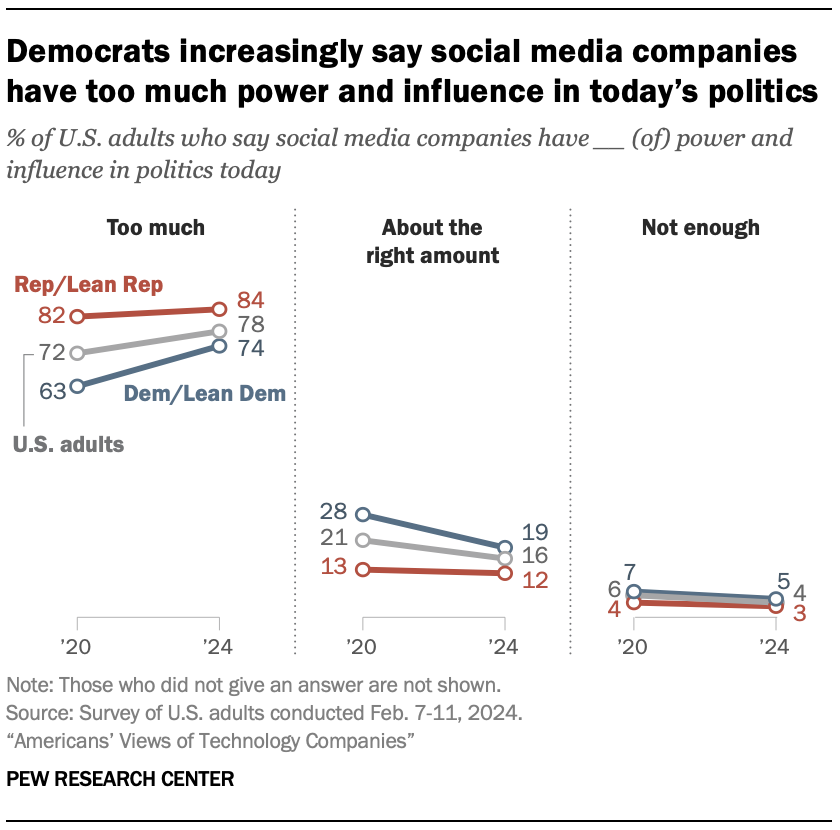
Since 2020, more Americans – particularly Democrats – believe social media companies wield too much political power. Roughly eight-in-ten Americans (78%) say these companies have too much power and influence in politics today, according to a new Pew Research Center survey of 10,133 U.S. adults conducted Feb. 7-11, 2024. This is up from 72% in 2020.
Another 16% say these sites have the right amount of political influence, while only 4% think they don’t have enough power.
Views by party
Republicans and independents who lean toward the Republican Party (84%) are more likely than Democrats and Democratic leaners (74%) to think these companies have too much political power. And while Republicans’ opinions have changed little since 2020, this view has grown more common among Democrats over the past four years: 74% of Democrats believe social media companies have too much power and influence in politics, up from 63% in 2020.
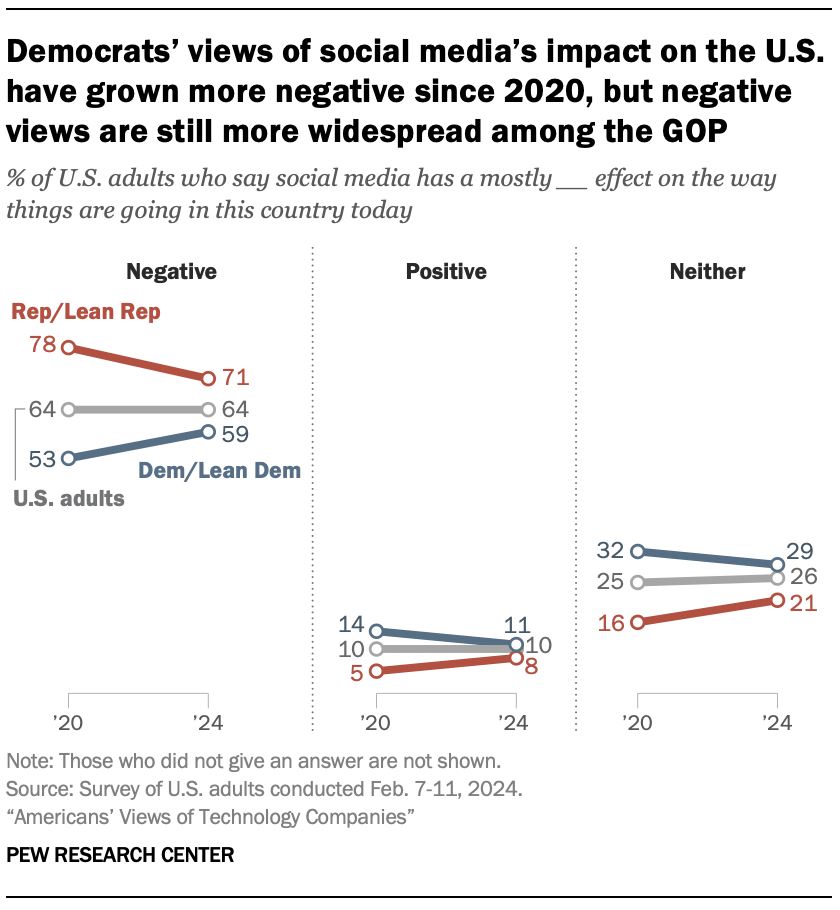
Americans are far more likely to say social media has a negative rather than positive impact on the country. Roughly two-thirds (64%) think social media has a mostly negative effect on the way things are going in the country today.
Only 10% describe social media as having a mostly positive impact on the country. And about a quarter say these sites have neither a positive nor a negative effect.
These overall figures are nearly identical to what the Center found in 2020. For instance, the share of Americans who see social media’s impact on the country as mostly negative has remained at 64%.
Views by party
Majorities in both political parties see social media’s impact on the country negatively, though Republicans remain more wary than Democrats (71% vs. 59%). That said, a growing number of Democrats believe these platforms have a mostly bad impact on the country, rising to 59% in our current survey, up from 53% in 2020.
By comparison, the share of Republicans who say social media negatively affects the way things are going in the country has dropped from 78% in 2020 to 71% today.
Political censorship and bias in Big Tech
As social media has become a key way people share news and information, some lawmakers and commentators – especially conservatives – have expressed concerns that these companies are politically biased and limit free speech.
Our survey finds that most Americans think social media sites actively censor political viewpoints they disagree with. Roughly eight-in-ten U.S. adults (83%) say it’s very or somewhat likely that these platforms intentionally censor political viewpoints they find objectionable, up from 77% in 2022. Just 17% in the current survey think this is not likely the case.
Views by party
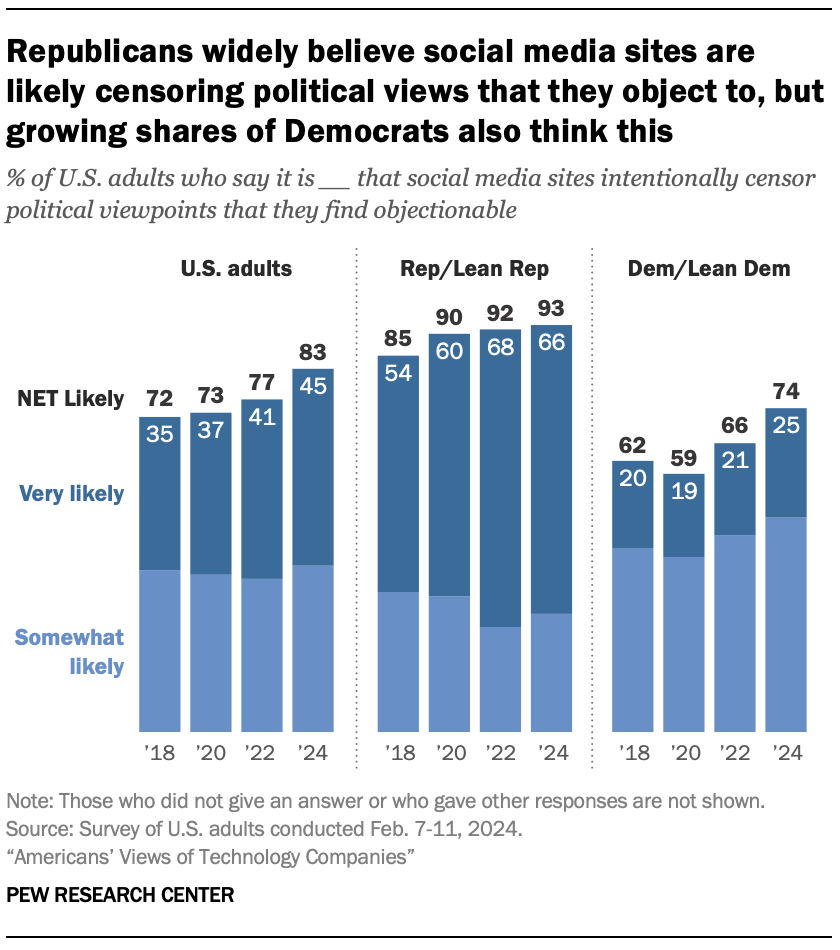
Majorities in both parties believe political censorship is likely occurring on social media, but more Republicans hold this view. Fully 93% of Republicans say it’s likely that social media sites intentionally censor political viewpoints that they find objectionable, including 66% who say that this is very likely happening.
By comparison, 74% of Democrats think this is likely occurring, with 25% saying there’s a strong possibility this is occurring.
Republicans’ views have held steady since 2022. But the share of Democrats who think it’s likely that social media sites intentionally censor political viewpoints they object to is rising – 74% say this today, up from 66% two years ago.
Do major technology companies have liberal or conservative biases?
Overall, Americans are more likely to think Big Tech companies support the views of liberals over conservatives than the other way around. More than four-in-ten U.S. adults (44%) think major technology companies support the views of liberals over conservatives. Far fewer – 15% – say these companies support conservative views over liberal ones. Still, a notable share (37%) thinks this industry equally values conservative and liberal viewpoints.
Views by party
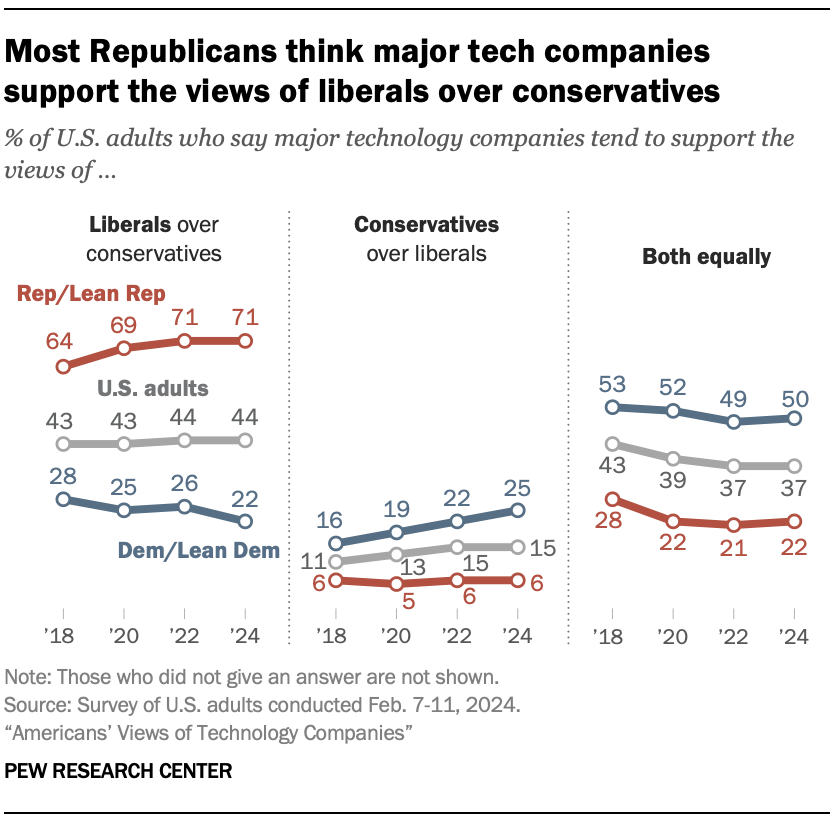
Republicans widely believe that major tech companies have a pro-liberal bias. Fully 71% of Republicans say major technology companies support the views of liberals over conservatives. Much smaller shares believe these companies support the views of liberals and conservatives equally (22%) or favor conservative beliefs over liberal ones (6%).
By contrast, the most commonly held view among Democrats is that technology companies support the views of conservatives and liberals equally, with 50% saying this. Roughly a quarter of Democrats either say that these companies favor the views of conservatives over liberals (25%) or liberals over conservatives (22%).
While there’s been little change in views since 2022, there are some differences when comparing today’s views to those in 2018, when we first started asking these questions.
Over the past six years, a rising share of Republicans say major tech companies favor liberal over conservative views (71% today vs. 64% in 2018), while more Democrats today than in the past think these companies support conservative views more than liberal ones (25% today vs. 16% in 2018).
Government regulation of technology companies
Amid concerns over free speech, social media’s impact on youth and AI’s impending foothold, lawmakers and advocates on both sides of the political aisle have pushed for more government oversight of the tech industry.
But there’s a long-running debate about what role the government should play in regulating Big Tech. We wanted to know where Americans stand, how views have changed over time, and whether opinions vary by party.
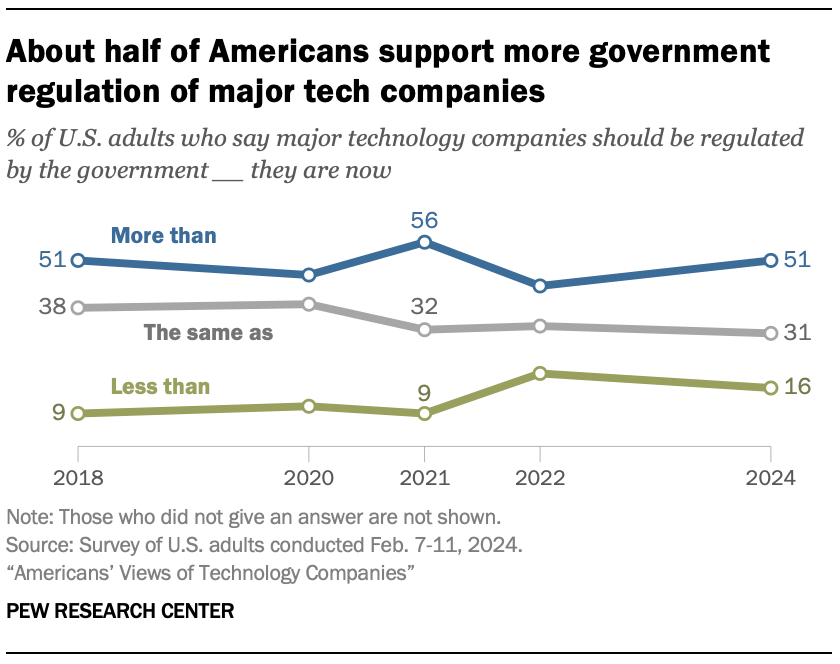
Americans favor more rather than less regulation of Big Tech companies. When asked whether the government should regulate major technology companies more, less or at its current level, 51% believe these companies should be regulated more than they are now. Far fewer – 16% – feel they should be regulated less than they are now.
Still, 31% say their current level of regulation should stay the same.
Support for more government regulation of technology companies is identical to what it was in 2018. Support for more regulation has risen and fallen somewhat over the past six years, ranging from 44% in 2022 to 56% in 2021. The share of Americans who think these companies should be regulated more than they are now is identical to what the Center found in 2018, when we first asked the question. At the same time, the share who say there should be less regulation has increased from 9% in 2018 to 16% today.
Views by party
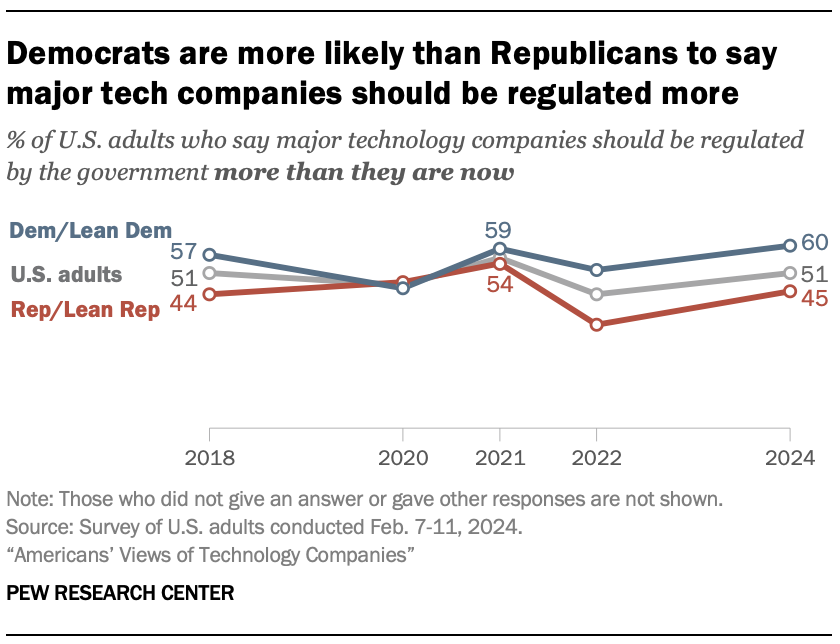
Democrats are more supportive of increased government oversight of tech companies than are Republicans. Six-in-ten Democrats say the government should regulate major technology companies more than it is now, compared with 45% of Republicans.
The partisan gap between Democrats and Republicans is similar to that in 2022. But these differences have not always been large. For instance, similar shares of Republicans (48%) and Democrats (46%) favored more regulation of technology companies back in 2020.